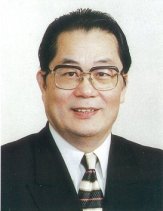Chiang Peng-chien
Taiwanese politician From Wikipedia, the free encyclopedia
Chiang Peng-chien (Chinese: 江鵬堅; pinyin: Jiāng Péngjiān; Wade–Giles: Chiāng P'éng-chiēn; Pe̍h-ōe-jī: Kang Pêng-kian; 25 April 1940 – 15 December 2000) was a Taiwanese politician who was a co-founder and the first chairperson of the Democratic Progressive Party. Chiang was elected a member of the Legislative Yuan in 1983 and became a member of the Control Yuan in 1996.
You can help expand this article with text translated from the corresponding article in Chinese. (March 2023) Click [show] for important translation instructions.
|
Chiang Peng-chien Kang Pêng-kian | |
|---|---|
 | |
| 1st Chairperson of the Democratic Progressive Party | |
| In office 28 November 1986 – 20 December 1987 | |
| Preceded by | Position established |
| Succeeded by | Yao Chia-wen |
| Member of the Control Yuan | |
| In office 1 September 1996 – 31 January 1999 | |
| 4th Secretary-General of the Democratic Progressive Party | |
| In office September 1992 – December 1993 | |
| Member of the Legislative Yuan | |
| In office 25 January 1995 – 31 January 1996 | |
| Preceded by | David Hou |
| Constituency | Republic of China (Democratic Progressive Party list) |
| In office 1 February 1984 – 31 January 1987 | |
| Constituency | Taipei |
| Personal details | |
| Born | 25 April 1940 Daitōtei, Taihoku Prefecture, Japanese Taiwan |
| Died | 15 December 2000 (aged 60) Taipei, Taiwan |
| Nationality | Republic of China |
| Political party | Democratic Progressive Party |
| Education | National Taiwan University (LLB, LLM) |
| Profession | Lawyer |
Early life
Chiang Peng-chien was born April 25, 1940, in Daitōtei, Taihoku Prefecture, Japanese-era Taiwan. His father was a shoemaker from Fujian, China.[1]
In 1955, Chiang entered the Taipei Municipal Jianguo High School. He was then accepted to National Taiwan University, majoring in law. After graduation, he passed the bar examination in 1964.[2] Chiang began practicing law after earning his master's degree.
Chiang founded the Taiwan Association for Human Rights. On Human Rights Day in 1979, members of the Formosa Magazine and other Tangwai pro-democracy advocates went on a demonstration. Many of the participants were arrested by the government and tried in military court. Chiang defended Lin Yi-hsiung, one of the Kaohsiung Eight.[3]
Political career
Chiang became involved in politics and supported the Tangwai movement. He was elected a member of the Legislative Yuan in 1983.[4] In September 1986, about 130 pro-democracy advocates, including Chiang, gathered at the Grand Hotel in Taipei to establish the Democratic Progressive Party (DPP). On November 10, 1986, he was elected the first chairperson of the party.[4]
In 1994, Chiang was a candidate for the DPP's nomination in the 1994 Taipei mayoral election. He competed against legislators Chen Shui-bian and Frank Hsieh and lost.[5] He returned to the Legislative Yuan in January 1995,[6] replacing David Hou as an at-large legislator on the DPP party list. In 1996, Chiang became a member of the Control Yuan. He worked to prevent any activities associated with black gold and actively investigated sensitive cases involved with former political oppression.[4]
Death and legacy
Chiang died in December 2000 of pancreatic cancer.[3] His widow Peng Feng-mei donated his writings and books to the Academia Historia for display.[7]
References
Wikiwand - on
Seamless Wikipedia browsing. On steroids.
